
 |
|
|
|
|
#1 |
|
Member
Join Date: Jun 2007
Location: Detroit (New Mayapan)
Posts: 96
|
I saw this shield in the biblical film, "King of Kings". The design on the shield looks more like something that someone in the prop department saw in a history book rather than something completely made up. Does anyone have any idea what this design might be?
Thanks in advance, and sorry for the picture quality- I took a picture of the TV screen. 
|
|
|

|
|
|
#2 | |
|
Member
Join Date: Jul 2006
Location: Buraimi Oman, on the border with the UAE
Posts: 4,408
|
Quote:
Salaams Queequeq~ Apparently its aN Augustion "scutum" Roman shield. At least it is very close. Wikipedia Quote "Scutum (/ˈskuːtəm/; plural scuta) is the Latin word for "shield", although it has in modern times come to be specifically associated with the rectangular, semi-cylindrical body shield carried by Roman legionaries." Unquote. Obtainable by typing into web search "roman shield insignia". Regards, Ibrahiim al Balooshi. 
Last edited by Ibrahiim al Balooshi; 5th January 2014 at 08:19 AM. |
|
|
|

|
|
|
#3 |
|
Member
Join Date: Mar 2006
Location: Room 101, Glos. UK
Posts: 4,184
|
i've not seen a roman shield of that shape referenced anywhere. the std. roman scutum of the republican period was a taller one than the later imperial ones.
 the legionary soldiers also tended to wear mail or scale armour rather than the segmented plate armour of imperial times. the imperial scutum:  movies tend to cut corners and flatten these rectangles, or even make them out of sheet metal (or plastic) the more rectangular semi cylindrical ones came later, along with various refinements to the helmet, adding brow bars, neck guards which got bigger over time, etc. cavalry carried a flat oval shield: 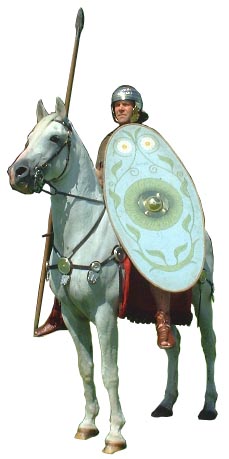 as did auxilliary cohorts  centurions would sometimes carry a similar oval shield in their legions colours. signifers carried a smaller round shield that could be used in one hand.  praetorian cavalry units would sometimes carry the flattened hex shield:  their infantry would use the taller republican shaped scutum. the scorpion was their favourite symbol. late imperial units carrier the dished oval shields, after constantine with the chi-rho christian symbol. usually with the longer cavalry spatha as the gladius fell out of fashion. later as northern barbarian mercenaries replaced the disciplined romans, the round flat 'viking' shield and longsword became the norm in roman infantry, which by that time were inferior arms, bypassed in popularity by the cataphracti, heavily armoured horse archers based on the persian model. the shield in question looks like a prop department's idea of local potentates local troops shield. the symbols somehow brings up visions of the maccabees who revolted against rome. the local hebrew vassal 'king' (herod?) at the time of jesus had his own household troops which would not have had roman pattern arms. Last edited by kronckew; 5th January 2014 at 01:22 PM. |
|
|

|
|
|
#4 |
|
(deceased)
Join Date: Sep 2008
Location: Bavaria, Germany - the center of 15th and 16th century gunmaking
Posts: 4,310
|
I'm much with Kronckew on this.
In my eyes, the symbol may show a stylized symmetrical crab or crayfish, meant as military allusion to both armor and back and forth moving tactics. Best, Michael |
|
|

|
|
|
#5 |
|
Member
Join Date: Jul 2006
Location: Buraimi Oman, on the border with the UAE
Posts: 4,408
|
Salaams all~ Here is the picture from #1. As you can see this is a modern conceptual style of shield (admitted by the author as seen on a recent film and likely to be a prop!) but.... as I have indicated ....the design on the shield face is quite similar in style. I show the Roman red shield for comparison in decorative shield face style...only.
Regards, Ibrahiim al Balooshi.  
Last edited by Ibrahiim al Balooshi; 5th January 2014 at 01:55 PM. |
|
|

|
|
|
#6 |
|
Member
Join Date: Mar 2006
Location: Room 101, Glos. UK
Posts: 4,184
|
found this museum example of a later persian shield:
edited: just watched some clips from that movie. the legionaries in the film were indeed equipped with this shield, which appears to be of metal with an arm loop and hand grip, a type never used by roman troops. they all used centre hand grip shields. this style is a much later style favoured of mounted troops. the symbol is the movie distortion of the common winged scutum symbol as shown in the post above. i agree the symbol is based on that, but the whole gestalt is wrong. as noted in the post below, the romans used laminated wood shields, flat or curved with a central metal plate or boss to protect the hand. as noted only one has been found which shows the laminated wood strip constuction. they are amply illustrated in stone on roman monuments like hadrians column. Last edited by kronckew; 5th January 2014 at 02:27 PM. |
|
|

|
|
|
#7 | |
|
Member
Join Date: Jul 2006
Location: Buraimi Oman, on the border with the UAE
Posts: 4,408
|
Quote:
Salaams Michael, Happy New Year !!! Apparently ~ The design was as below~ Regards, Ibrahiim al Balooshi From timetrips.co.uk Quote''There were many kinds of Roman shields used by legionaries. Earlier on they were oval and flat, but at the time of the invasion of Britain (AD43) most were rectangular and curved, like part of a cylinder. This shield is called a scutum. The shields were mostly made of wood - a few layers glued together to make the curved shape. Some extra strips of wood were glued on the back for more strength. The shield was then covered in leather and a sheet of linen cloth added to the front. Designs were usually painted onto the front. There were many designs, but one of the most famous is the eagle's wings and lightning bolt. The eagle was the symbol of the Roman army, and the lightning bolt was the symbol of Jupiter, the king of the gods (Jupiter was the Roman version of the Greek god Zeus, who threw thunderbolts from the sky). Only one scutum in good condition has ever been found, at Dura Europos, a Roman fort in Syria. It has pictures of an eagle, a lion, and winged gods. It was made in the 200s AD. In battle the shield was held with the arm straight, holding a grip in the middle. The grip was across a hole cut from the middle of the shield. This hole was protected by a metal boss, a hemisphere of iron with an iron plate around it. The soldier could push this boss into his enemy to knock him off balance. On the Dura Europos shield below the boss has been lost." Unquote. |
|
|
|

|
|
|
#8 |
|
Member
Join Date: Mar 2006
Location: Room 101, Glos. UK
Posts: 4,184
|
late roman round/oval scutums - they appear to have had more leeway to customizing the paint jobs than earlier eras.
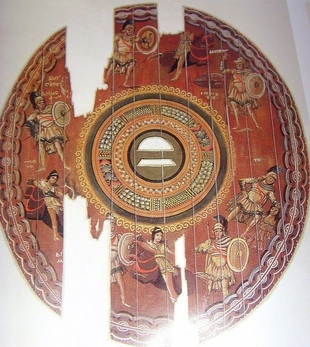 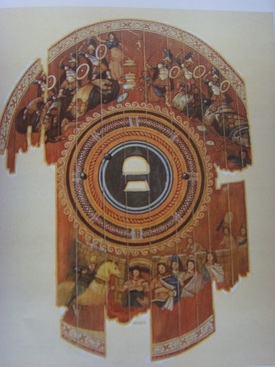 a copy of a pre-constantinian one. 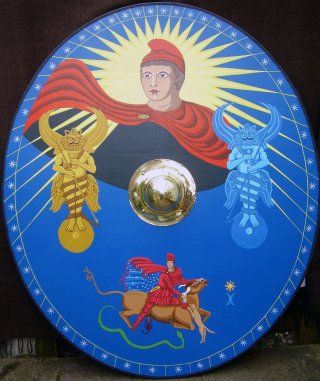 this is mithras, a god similar to christ in that he rose from the dead, he was a favoured military soldier's god. the beliefs and rituals of mithras were never written down, so we have little info on the religion. it was replaced of course by christianity which i suspect incorporated parts of it. shield bosses also were objects of decoration, legionary veterans would either decorate or have decorated their sword scabbards, pugio dagger scabbards, belts, helmets, and shield bosses. i imaging a centurion had this one: 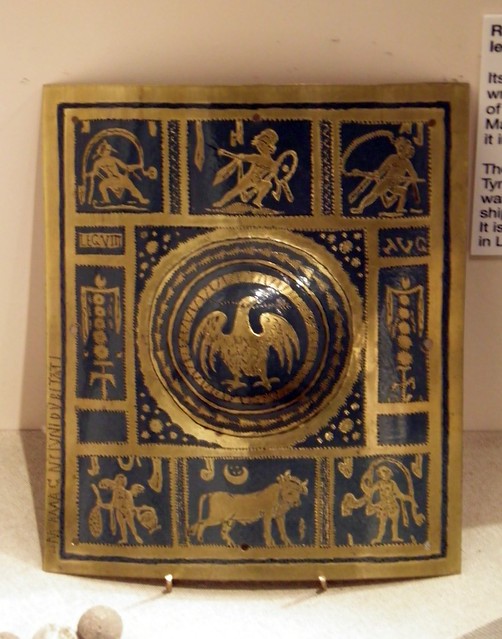 others of lesser quality have been found. as wood shields would get damaged in battle, and replaced afterwards, i would hazard that these bosses would be treasured possessions transferred from scutum to scutum as the wood part deteriorated and was replaced. |
|
|

|
 |
|
|